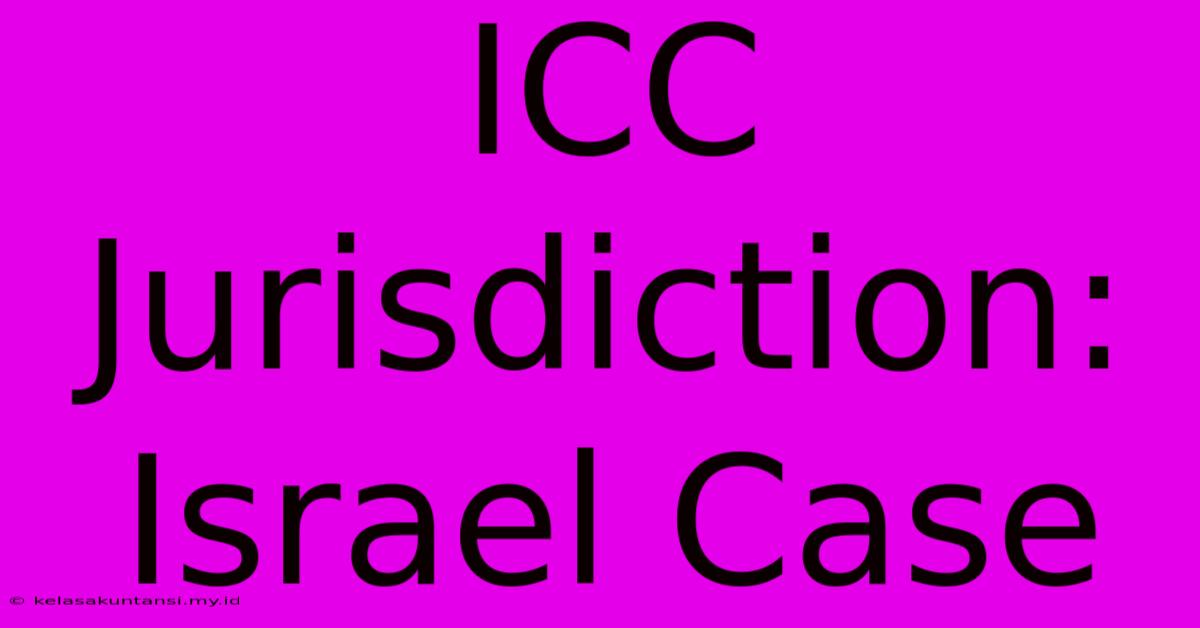ICC Jurisdiction: Israel Case

Temukan informasi yang lebih rinci dan menarik di situs web kami. Klik tautan di bawah ini untuk memulai informasi lanjutan: Visit Best Website meltwatermedia.ca. Jangan lewatkan!
Table of Contents
- ICC Jurisdiction: The Israel Case – A Complex Legal Battle
- The ICC's Mandate and the Palestinian Territories
- The Key Arguments Regarding Jurisdiction
- The Argument of Statehood:
- The Argument of Self-Defense:
- The Argument of Political Bias:
- The Argument of Complementary Jurisdiction:
- The Ongoing Investigations and Their Implications
- Conclusion: A Path Forward?
ICC Jurisdiction: The Israel Case – A Complex Legal Battle
The International Criminal Court (ICC) and its jurisdiction over alleged crimes committed in the Palestinian Territories represent one of the most complex and contentious legal battles of our time. This article delves into the intricacies of the ICC's involvement, focusing specifically on the ongoing investigations concerning Israel.
The ICC's Mandate and the Palestinian Territories
The ICC's primary mandate is to prosecute individuals for the gravest crimes under international law: genocide, war crimes, crimes against humanity, and the crime of aggression. Its jurisdiction, however, is not universal. It primarily applies to situations where states have ratified the Rome Statute, the treaty establishing the ICC, or when the UN Security Council refers a situation to the Court.
The Palestinian Authority (PA) acceded to the Rome Statute in 2015, claiming jurisdiction over territories occupied since 1967. This action triggered a series of legal and political challenges, largely centered around whether the ICC has jurisdiction over alleged crimes committed by Israelis within these territories.
The Key Arguments Regarding Jurisdiction
Israel, along with the United States and other nations, vehemently disputes the ICC's jurisdiction over these situations. Several key arguments are frequently raised:
The Argument of Statehood:
Israel contests the Palestinian Authority's claim to statehood, arguing that the PA lacks the necessary attributes of a sovereign state to bring cases before the ICC. This argument hinges on the ongoing Israeli-Palestinian conflict and the disputed status of the territories.
The Argument of Self-Defense:
Israel often invokes the right to self-defense under international law, arguing that its actions in the Palestinian territories are necessary to protect its citizens from attacks. This necessitates a careful examination of the proportionality and necessity of the actions taken.
The Argument of Political Bias:
Critics accuse the ICC of exhibiting bias against Israel, pointing to the disproportionate focus on alleged Israeli actions compared to actions by other parties involved in the conflict. Concerns about the ICC's impartiality and the potential for politicization are frequently voiced.
The Argument of Complementary Jurisdiction:
The ICC's jurisdiction is “complementary,” meaning it only intervenes when national courts are unwilling or unable genuinely to investigate and prosecute crimes. Israel maintains that it has a functioning justice system and is capable of investigating and prosecuting alleged crimes within its own jurisdiction.
The Ongoing Investigations and Their Implications
The ICC's ongoing investigations into alleged war crimes and crimes against humanity in the Palestinian Territories have ignited significant international debate. The investigations scrutinize actions taken by both Israeli forces and Palestinian armed groups. The outcome of these investigations, irrespective of the verdict, will have profound implications for international law, the Israeli-Palestinian conflict, and the future role of the ICC.
Potential Consequences: The ICC's findings could lead to indictments, arrest warrants, and potential trials for individuals involved in alleged crimes. This process could further escalate tensions in the region and significantly impact the peace process. Furthermore, the legitimacy and effectiveness of the ICC itself will be heavily influenced by how the investigations and subsequent proceedings are perceived by the international community.
Conclusion: A Path Forward?
The ICC's involvement in the Israeli-Palestinian conflict is fraught with complexities and deep-seated political sensitivities. While the court aims to uphold international justice and accountability, its actions have raised significant questions regarding its jurisdiction, impartiality, and effectiveness in resolving such a highly politically charged conflict. Finding a path toward a just and lasting resolution will require a sustained effort to address the fundamental issues underpinning the conflict, coupled with a careful consideration of the legal frameworks and the limits of international justice mechanisms. The debate surrounding ICC jurisdiction in the Israel case is likely to continue for years to come, shaping the future of international criminal justice and the Israeli-Palestinian conflict alike.

Football Match Schedule
Upcoming Matches
Latest Posts
- How to Improve Your SEO Skills
Published on: 2024-12-01 - Understanding the Basics of HTML5
Published on: 2024-11-30 - Tips Learn Trading for Beginners
Published on: 2024-11-28
Terimakasih telah mengunjungi situs web kami ICC Jurisdiction: Israel Case. Kami berharap informasi yang kami sampaikan dapat membantu Anda. Jangan sungkan untuk menghubungi kami jika ada pertanyaan atau butuh bantuan tambahan. Sampai bertemu di lain waktu, dan jangan lupa untuk menyimpan halaman ini!
Kami berterima kasih atas kunjungan Anda untuk melihat lebih jauh. ICC Jurisdiction: Israel Case. Informasikan kepada kami jika Anda memerlukan bantuan tambahan. Tandai situs ini dan pastikan untuk kembali lagi segera!
Featured Posts
-
Riize On New Music Fan Appreciation Mama
Nov 22, 2024
-
Suspected Methanol Kills Tourists In Laos
Nov 22, 2024
-
Nvidia Powered Quantum Simulation Dynamiqs
Nov 22, 2024
-
Nba 2024 Lakers Vs Magic Predictions
Nov 22, 2024
-
Seunghans Riize Departure Antons Statement
Nov 22, 2024
